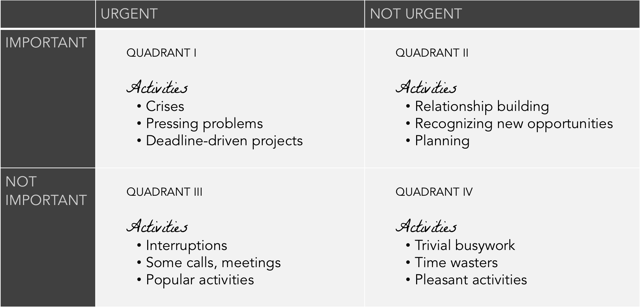All of us need to succeed. And one path to success is figuring out the habits that may assist us on our journey.
I like to recommend beginning that path by studying Stephen Covey’s best-selling ebook, The 7 Habits of Extremely Efficient Individuals. Haven’t got time to learn all 432 pages?
I get it — most of us do not. That is why we summarized all the ebook for you beneath.
What habits do extremely efficient folks have?
The ebook opens with an evidence of what number of people who’ve achieved a excessive diploma of outward success nonetheless discover themselves battling an inside want for creating private effectiveness and rising wholesome relationships with different folks.
Covey believes the best way we see the world is solely based mostly on our personal perceptions. As a way to change a given scenario, we should change ourselves, and with a purpose to change ourselves, we should be capable to change our perceptions.
In learning over 200 years of literature on the idea of “success,” Covey recognized a vital change in the best way that people have outlined success over time.
In earlier instances, the inspiration of success rested upon character ethic (issues like integrity, humility, constancy, temperance, braveness, justice, endurance, business, simplicity, modesty, and the Golden Rule). However beginning across the Nineteen Twenties, the best way folks considered success shifted to what Covey calls “persona ethic” (the place success is a perform of persona, public picture, attitudes, and behaviors).
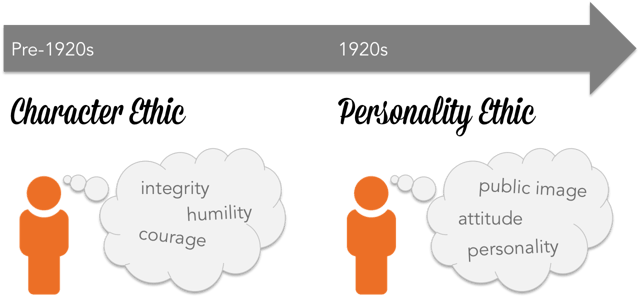
Today, folks search for fast fixes. They see a profitable individual, workforce, or group and ask, “How do you do it? Train me your methods!” However these “shortcuts” that we search for, hoping to avoid wasting effort and time and nonetheless obtain the specified end result, are merely band-aids that can yield short-term options. They do not deal with the underlying situation.
“The way in which we see the issue is the issue,” Covey writes. We should enable ourselves to bear paradigm shifts — to alter ourselves basically and never simply alter our attitudes and behaviors on the floor stage — with a purpose to obtain true change.
That is the place the seven habits of extremely efficient folks are available in:
- Habits 1, 2, and three are centered on self-mastery and transferring from dependence to independence.
- Habits 4, 5, and 6 are centered on creating teamwork, collaboration, and communication abilities, and transferring from independence to interdependence.
- Behavior 7 is concentrated on steady progress and enchancment and embodies all the opposite habits.
Let’s dive into the 7 habits, now — hold studying, or click on on a particular behavior to leap proper to that part.
7 Habits of Extremely Efficient Individuals
1. Be Proactive
2. Start with the Finish in Thoughts
5. Search First to Perceive, Then to Be Understood
6. Synergize
1. Be Proactive
Fast Abstract:
We’re in cost. We select the scripts by which to reside our lives. Use this self-awareness to be proactive and take duty in your decisions.
The primary behavior that Covey discusses is being proactive. What distinguishes us as people from all different animals is our inherent capacity to look at our personal character, to resolve learn how to view ourselves and our conditions, and to manage our personal effectiveness.
Put merely, with a purpose to be efficient one should be proactive.
Reactive folks take a passive stance — they imagine the world is occurring to them. They are saying issues like:
- “There’s nothing I can do.“
- “That is simply the best way I’m.“
They suppose the issue is “on the market” — however that thought is the issue. Reactivity turns into a self-fulfilling prophecy, and reactive folks really feel more and more victimized and uncontrolled.
Proactive folks, nevertheless, acknowledge they’ve duty — or “response-ability,” which Covey defines as the power to decide on how you’ll reply to a given stimulus or scenario.
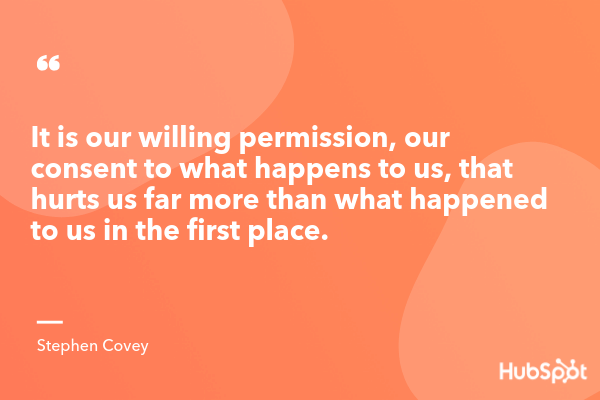
As a way to be proactive, we should deal with the Circle of Affect that lies inside our Circle of Concern— in different phrases, we should work on the issues we are able to do one thing about.
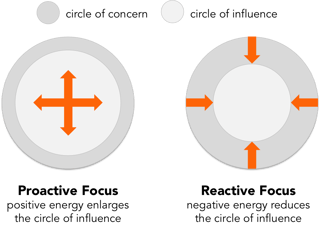
The constructive power we exert will trigger our Circle of Affect to broaden.
Reactive folks, however, deal with issues which might be of their Circle of Concern however not of their Circle of Affect, which results in blaming exterior elements, emanating unfavourable power, and inflicting their Circle of Affect to shrink.
Key Classes:
Problem your self to check the precept of proactivity by doing the next:
1. Begin changing reactive language with proactive language.
Reactive = “He makes me so mad.”Proactive = “I management my very own emotions.”
2. Convert reactive duties into proactive ones.
2. Start with the Finish in Thoughts
Fast Abstract:
Begin with a transparent vacation spot in thoughts. Covey says we are able to use our creativeness to develop a imaginative and prescient of what we need to turn into and use our conscience to resolve what values will information us.
Most of us discover it moderately straightforward to busy ourselves. We work onerous to attain victories — promotions, greater revenue, extra recognition. However we do not usually cease to judge the which means behind this busyness, behind these victories — we do not ask ourselves if this stuff that we deal with so intently are what actually matter to us.
Behavior 2 means that, in every little thing we do, we must always start with the top in thoughts. Begin with a transparent vacation spot. That manner, we are able to be sure the steps we’re taking are in the suitable route.
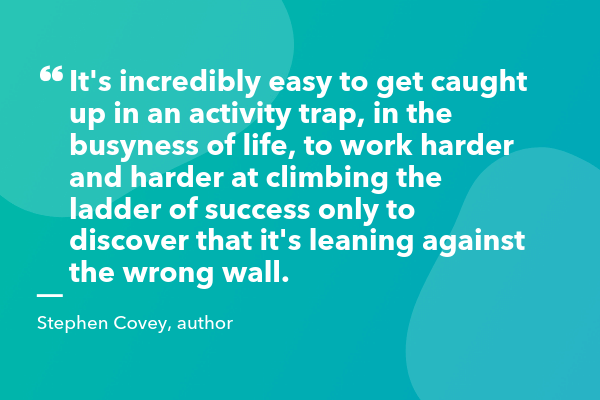
Covey emphasizes that our self-awareness empowers us to form our personal lives, as a substitute of residing our lives by default or based mostly on the requirements or preferences of others.
Starting with the top in thoughts can also be extraordinarily vital for companies. Being a supervisor is about optimizing for effectivity. However being a frontrunner is about setting the suitable strategic imaginative and prescient in your group within the first place, and asking, “What are we making an attempt to perform?”
Earlier than we as people or organizations can begin setting and attaining targets, we should be capable to establish our values. This course of might contain some rescripting to have the ability to assert our personal private values.
Rescripting, Covey explains, is recognizing ineffective scripts which have been written for you, and altering these scripts by proactively writing new ones which might be constructed of your individual values.
Additionally it is vital to establish our heart. No matter is on the heart of our life would be the supply of our safety, steering, knowledge, and energy.
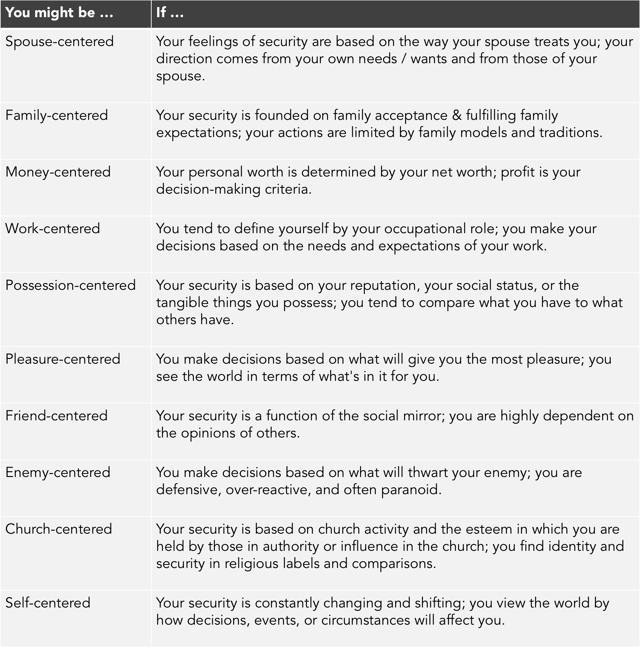
Our facilities have an effect on us basically — they decide our each day choices, actions, and motivations, in addition to our interpretation of occasions.
Nonetheless, Covey notes that none of those facilities are optimum and that as a substitute, we must always try to be principle-centered. We must always establish the timeless, unchanging rules by which we should reside our lives. This can give us the steering that we have to align our behaviors with our beliefs and values.
Key Classes:
Problem your self to check the precept of starting with the top in thoughts by doing the next:
1. Visualize in wealthy element your individual funeral. Who’s there? What are they saying about you? About the way you lived your life? In regards to the relationships you had? What would you like them to say? Take into consideration how your priorities would change when you solely had 30 extra days to reside. Begin residing by these priorities.
2. Break down completely different roles in your life — whether or not skilled, private, or group — and listing three to 5 targets you need to obtain for every.
3. Outline what scares you. Public talking? Important suggestions after writing a ebook? Write down the worst-case state of affairs in your greatest worry, then visualize how you will deal with this case. Write down precisely how you will deal with it.
3. Put First Issues First
Fast Abstract:
As a way to handle ourselves successfully, we should put first issues first. We should have the self-discipline to prioritize our day-to-day actions based mostly on what’s most vital, not what’s most pressing.
In Behavior 2, we mentioned the significance of figuring out our values and understanding what it’s we’re getting down to obtain. Behavior 3 is about truly going after these targets, and executing on our priorities on a day-to-day, moment-to-moment foundation.
As a way to preserve the self-discipline and the main focus to remain on monitor towards our targets, we have to have the willpower to do one thing after we do not need to do it. We have to act in accordance with our values moderately than our wishes or impulses at any given second.
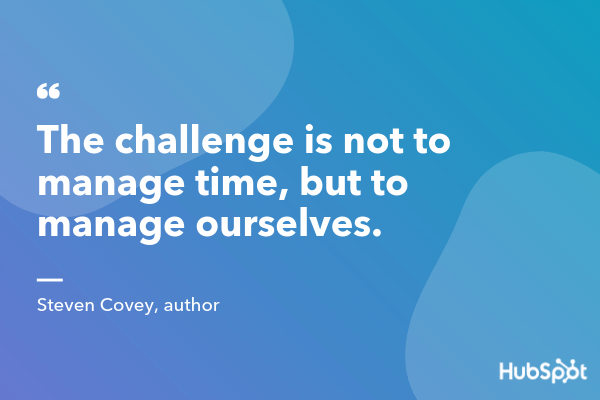
All actions could be categorized based mostly on two elements: Pressing and vital. Check out this time administration matrix:
We react to pressing issues. We spend our time doing issues that aren’t vital. That implies that we neglect Quadrant II, which is the truly most vital of all of them.
If we deal with Quadrant I and spend our time managing crises and issues, it retains getting larger and greater till it consumes us. This results in stress, burnout, and continuously placing out fires.
If we deal with Quadrant III, we spend most of our time reacting to issues that appear pressing, when the fact is their perceived urgency relies on the priorities and expectations of others. This results in short-term focus, feeling uncontrolled, and shallow or damaged relationships.
If we deal with Quadrant IV, we’re mainly main an irresponsible life. This usually results in getting fired from jobs and being extremely depending on others.
Quadrant II is on the coronary heart of efficient private administration. It offers with issues like constructing relationships, long-term planning, exercising, preparation — all issues we all know we have to do however someway seldom get round to really doing as a result of they do not really feel pressing.
As a way to focus our time in Quadrant II, now we have to learn to say “no” to different actions, generally ones that appear pressing. We additionally want to have the ability to delegate successfully.
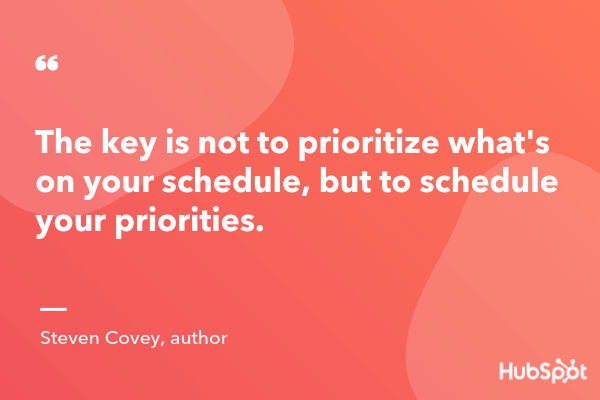
Plus, after we deal with Quadrant II, it means we’re considering forward, engaged on the roots, and stopping crises from taking place within the first place! This helps us implement the Pareto Precept — 80% of your outcomes come from 20% of your time.
We must always at all times preserve a major deal with relationships and outcomes, and a secondary deal with time.
“Assume effectiveness with folks and effectivity with issues.” —Stephen Covey
Key Classes:
Listed here are some methods you possibly can follow placing first issues first:
1. Determine a Quadrant II exercise you’ve got been neglecting. Write it down and decide to implementing it.
2. Create your individual time administration matrix to start out prioritizing.
3. Estimate how a lot time you spend in every quadrant. Then log your time over 3 days. How correct was your estimate? How a lot time did you spend in Quadrant II (a very powerful quadrant)?
4. Assume Win-Win
Fast Abstract:
As a way to set up efficient interdependent relationships, we should decide to creating Win-Win conditions which might be mutually useful and satisfying to every celebration.
Covey explains that there are six paradigms of human interplay:
1. Win-Win: Each folks win. Agreements or options are mutually useful and satisfying to each events.
2. Win-Lose: “If I win, you lose.” Win-Lose individuals are inclined to make use of place, energy, credentials, and persona to get their manner.
3. Lose-Win: “I lose, you win.” Lose-Win individuals are fast to please and appease, and search power from recognition or acceptance.
4. Lose-Lose: Each folks lose. When two Win-Lose folks get collectively — that’s, when two, decided, cussed, ego-invested people work together — the end result will probably be Lose-Lose.
5. Win: Individuals with the Win mentality do not essentially need another person to lose — that is irrelevant. What issues is that they get what they need.
6. Win-Win or No Deal: If you cannot attain an settlement that’s mutually useful, there isn’t a deal.
The most suitable choice is to create Win-Win conditions. With Win-Lose, or Lose-Win, one individual seems to get what he needs for the second, however the outcomes will negatively affect the connection between these two folks going ahead.
The Win-Win or No Deal choice is vital to make use of as a backup. When now we have No Deal as an choice in our thoughts, it liberates us from needing to control folks and push our personal agenda. We could be open and actually attempt to perceive the underlying points.
In fixing for Win-Win, we should think about two elements: Consideration and braveness. Check out the next chart:

“To go for Win-Win, you not solely need to be good, you need to be brave.” — Stephen Covey
One other vital consider fixing for Win-Win conditions is sustaining an Abundance Mentality, or the assumption that there is a lot on the market for everybody.
Most individuals function with the Shortage Mentality — which means they act as if every little thing is zero-sum (in different phrases, when you get it, I do not). Individuals with the Shortage Mentality have a really onerous time sharing recognition or credit score and discover it tough to be genuinely pleased about different folks’s successes.
In relation to interpersonal management, the extra real our character is, the upper our stage of proactivity; the extra dedicated we’re to Win-Win, the extra highly effective our affect will probably be.
To attain Win-Win, hold the deal with outcomes, not strategies; on issues, not folks.
Lastly, the spirit of Win-Win cannot survive in an surroundings of competitors. As a corporation, we have to align our reward system with our targets and values and have the techniques in place to help Win-Win.
Key Classes:
Get your self to start out considering Win-Win with these challenges:
1. Take into consideration an upcoming interplay the place you will be trying to achieve an settlement or resolution. Write down a listing of what the opposite individual is in search of. Subsequent, write a listing subsequent to that of how one can make a proposal to fulfill these wants.
2. Determine three vital relationships in your life. Take into consideration what you are feeling the stability is in every of these relationships. Do you give greater than you’re taking? Take greater than you give? Write down 10 methods to at all times give greater than you’re taking with each.
3. Deeply think about your individual interplay tendencies. Are they Win-Lose? How does that have an effect on your interactions with others? Are you able to establish the supply of that strategy? Decide whether or not or not this strategy serves you properly in your relationships. Write all of this down.
E mail is one place all of us shortly construct poor habits. Fairly than losing time by copying and pasting electronic mail templates that you just use day by day, we suggest utilizing HubSpot’s free CRM to simply ship customized electronic mail templates in Gmail and Outlook.
5. Search First to Perceive, Then to Be Understood
Fast Abstract:
Earlier than we are able to supply recommendation, recommend options, or successfully work together with one other individual in any manner, we should search to deeply perceive them and their perspective by way of empathic listening.
As an example you go to an optometrist and inform him that you’ve got been having bother seeing clearly, and he takes off his glasses, fingers them to you and says, “Right here, attempt these — they have been working for me for years!” You set them on, however they solely make the issue worse. What are the probabilities you’d return to that optometrist?
Sadly, we do the identical factor in our on a regular basis interactions with others. We prescribe an answer earlier than we diagnose the issue. We do not search to deeply perceive the issue first.
Behavior 5 says that we should search first to grasp, then to be understood. As a way to search to grasp, we should study to pay attention.
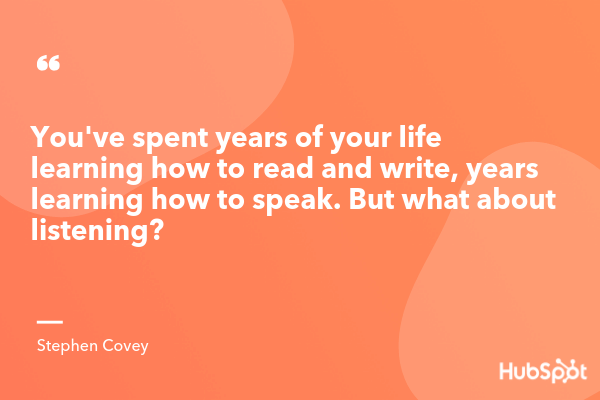
We will not merely use one approach to grasp somebody. In truth, if an individual senses that we’re manipulating her, she’s going to query our motives and can now not really feel secure opening as much as us.
“You need to construct the abilities of empathic listening on a base of character that evokes openness and belief.” — Stephen Covey
To pay attention empathically requires a basic paradigm shift. We usually search first to be understood. Most individuals pay attention with the intent to reply, to not perceive. At any given second, they’re both talking or getting ready to talk.
In any case, Covey factors out, communication consultants estimate that:
Once we pay attention autobiographically — in different phrases, with our personal perspective as our body of reference — we have a tendency to reply in certainly one of 4 methods:
1. Consider: Agree or disagree with what is claimed
2. Probe: Ask questions from our personal body of reference
3. Advise: Give counsel based mostly on our personal expertise
4. Interpret: Attempt to determine the individual’s motives and conduct based mostly on our personal motives and conduct
But when we substitute a majority of these response with empathic listening, we see dramatic leads to improved communication. It takes time to make this shift, nevertheless it does not take almost as lengthy to follow empathic listening because it does to again up and proper misunderstandings, or to reside with unexpressed and unresolved issues solely to have them floor afterward.
The second a part of Behavior 5 is ” … then to be understood.” That is equally essential in attaining Win-Win options.
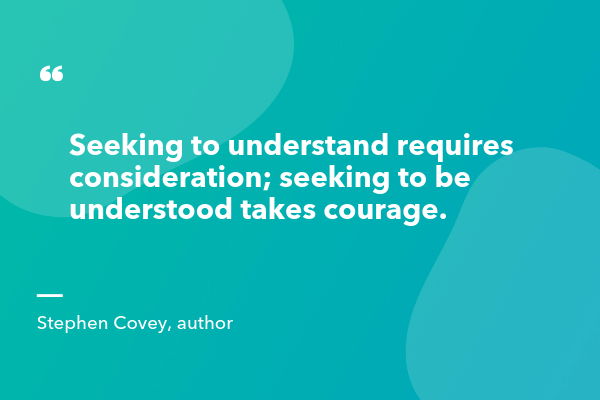
Once we’re capable of current our concepts clearly, and within the context of a deep understanding of the opposite individual’s wants and issues, we considerably enhance the credibility of your concepts.
Key Classes:
Listed here are a couple of methods to get your self within the behavior of searching for first to grasp:
1. Subsequent time you are watching two folks speaking, cowl your ears and watch. What feelings are being communicated that may not come throughout by way of phrases alone? Was one individual or the opposite extra within the dialog? Write down what you seen.
2. Subsequent time you give a presentation, root it in empathy. Start by describing the viewers’s standpoint in nice element. What issues are they dealing with? How is what you are about to say providing an answer to their issues?
6. Synergize
Fast Abstract:
By understanding and valuing the variations in one other individual’s perspective, now we have the chance to create synergy, which permits us to uncover new potentialities by way of openness and creativity.
The mixture of all the opposite habits prepares us for Behavior 6, which is the behavior of synergy or “When one plus one equals three or extra and the entire is nice than the sum of its elements.”
For instance, when you plant two crops shut collectively, their roots will co-mingle and enhance the standard of the soil, in order that each crops will develop higher than they’d on their very own.
Synergy permits us to create new options and open new potentialities. It permits us as a bunch to collectively conform to ditch the previous scripts and write new ones.
“Doubtless, you need to depart the consolation zone of base camp and confront a completely new and unknown wilderness.” —Stephen Covey
So how can we introduce synergy to a given scenario or surroundings? Begin with habits 4 and 5 — you will need to suppose Win-Win and search first to grasp.
After you have these in thoughts, you possibly can pool your wishes with these of the opposite individual or group. And then you definitely’re not on reverse sides of the issue — you are collectively on one aspect, wanting on the downside, understanding all of the wants, and dealing to create a 3rd different that can meet them.
What we find yourself with isn’t a transaction, however a change. Each side get what they need, they usually construct their relationship within the course of.
By placing forth a spirit of belief and security, we’ll immediate others to turn into extraordinarily open and feed on one another’s insights and concepts, creating synergy.
The actual essence of synergy is valuing the variations — the psychological, emotional, and psychological variations between folks.
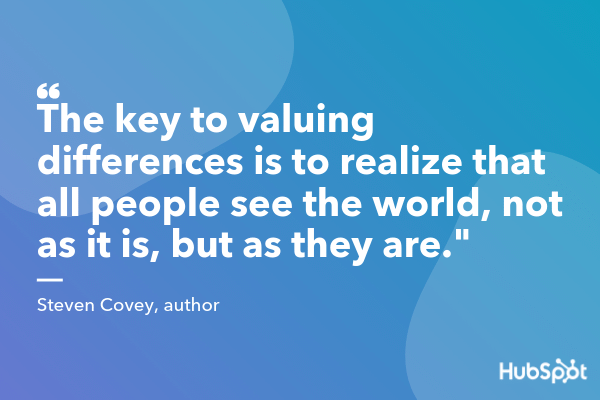
In any case, if two folks lend a hand, one is pointless. Once we turn into conscious of somebody’s completely different perspective, we are able to say, “Good! You see it in a different way! Assist me see what you see.”
We search first to grasp, after which we discover power and utility in these completely different views with a purpose to create new potentialities and Win-Win outcomes.
Synergy lets you:
- Worth the variations in different folks as a technique to broaden your perspective
- Sidestep unfavourable power and search for the nice in others
- Train braveness in interdependent conditions to be open and encourage others to be open
- Catalyze creativity and discover a resolution that will probably be higher for everybody by in search of a 3rd different
Key Classes:
1. Make a listing of people that irritate you. Now select only one individual. How are their views completely different? Put your self of their footwear for one minute. Assume and faux the way it feels to be them. Does this enable you to perceive them higher?
Now subsequent time you are in a disagreement with that individual, attempt to perceive their issues and why they disagree with you. The higher you possibly can perceive them, the simpler it is going to be to alter their thoughts — or change yours.
2. Make a listing of individuals with whom you get alongside properly. Now select only one individual. How are their views completely different? Now write down a scenario the place you had wonderful teamwork and synergy. Why? What circumstances had been met to achieve such fluidity in your interactions? How will you recreate these circumstances once more?
7. Sharpen the Noticed
Fast Abstract:
To be efficient, we should commit the time to renewing ourselves bodily, spiritually, mentally, and socially. Steady renewal permits us to synergistically enhance our capacity to follow every behavior.
Behavior 7 is concentrated round renewal, or taking time to “sharpen the noticed.” It surrounds all the different habits and makes each potential by preserving and enhancing your biggest asset — your self.
There are 4 dimensions of our nature, and every should be exercised repeatedly, and in balanced methods:
Bodily Dimension: The objective of steady bodily enchancment is to train our physique in a manner that can improve our capability to work, adapt, and luxuriate in.
To resume ourselves bodily, we should:
- Eat properly
- Get ample relaxation and leisure
- Train regularly to construct endurance, flexibility, and power
Specializing in the bodily dimension helps develop Behavior 1 muscle tissue of proactivity. We act based mostly on the worth of well-being as a substitute of reacting to the forces that hold us from health.
Religious Dimension: The objective of renewing our religious self is to supply management to our life and reinforce your dedication to our worth system.
To resume your self spiritually, you possibly can:
- Apply each day meditation
- Talk with nature
- Immerse your self in nice literature or music
A deal with our religious dimension helps us follow Behavior 2, as we constantly revise and commit ourselves to our values, so we are able to start with the top in thoughts.
Psychological Dimension: The objective of renewing our psychological well being is to proceed increasing our thoughts.
To resume your self mentally, you possibly can:
- Learn good literature
- Maintain a journal of your ideas, experiences, and insights
- Restrict tv watching to solely these packages that enrich your life and thoughts
Specializing in our psychological dimension helps us follow Behavior 3 by managing ourselves successfully to maximise the usage of our time and assets.
Social/Emotional Dimension: The objective of renewing ourselves socially is to develop significant relationships.
To resume your self emotionally, you possibly can:
- Search to deeply perceive different folks
- Make a contribution to significant initiatives that enhance the lives of others
- Keep an Abundance Mentality, and search to assist others discover success
Renewing our social and emotional dimension helps us follow Habits 4, 5, and 6 by recognizing that Win-Win options do exist, searching for to grasp others, and discovering mutually useful third options by way of synergy.
“Not a day goes by that we won’t a minimum of serve one different human being by making deposits of unconditional love.” -Stephen Covey
As we deal with renewing ourselves alongside these 4 dimensions, we should additionally search to be a constructive scripter for different folks. We should look to encourage others to the next path by exhibiting them we imagine in them, by listening to them empathically, by encouraging them to be proactive.
The actual fantastic thing about the 7 Habits is that enchancment in a single behavior synergistically will increase our capacity to enhance the remainder.
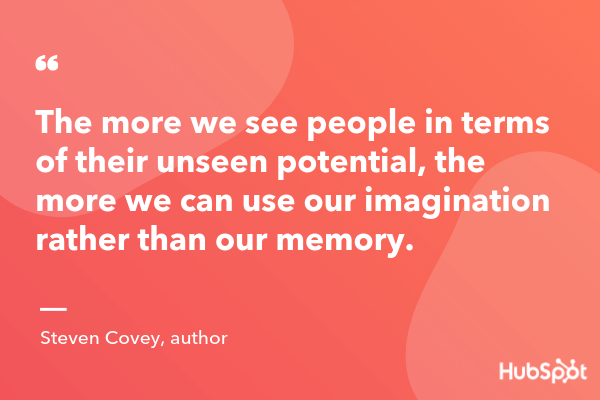
Renewal is the method that empowers us to maneuver alongside an upward spiral of progress and alter, of steady enchancment.
Key Classes:
1. Make a listing of actions that will enable you to renew your self alongside every of the 4 dimensions. Choose one exercise for every dimension and listing it as a objective for the approaching week. On the finish of the week, consider your efficiency. What led you to succeed or fail to perform every objective?
2. Decide to writing down a particular “sharpen the noticed” exercise in all 4 dimensions each week, to do them, and to judge your efficiency and outcomes.
Initially printed Apr 11, 2022 8:00:00 AM, up to date April 11 2022
![Download Now: How to Be More Productive at Work [Free Guide + Templates]](https://no-cache.hubspot.com/cta/default/53/5ab914ce-204e-40ef-acfe-d7bfec642e1a.png)
